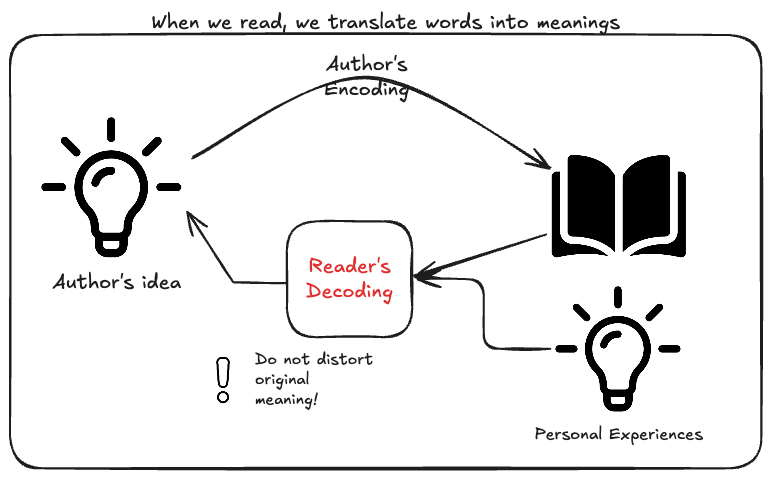The Art of Close Reading
Warning
This page is currently under development: the content is not yet final and may be subject to significant changes.
Reading For a Purpose
The universal purpose why we read is to figure out what an author has to say on a given subject. But how is the author’s message conveyed to the reader?

- The author’s idea is translated into words.
- The reader can use and convert these words into the author’s original idea.
The reader makes use of personal experiences and ideas to facilitate the re-translation process. For instance, if the author is talking about the evolution of the TV-Series, having watched many of the aforementioned Tv-Series can make the author’s ideas easier to understand and enrich them through additional examples, or counter-arguments against the thesis. At the same time, personal experiences and ideas can negatively influence the decoding process, because the reader might involuntarily project the author’s ideas into their own meaning, which is usually close to their set of previous beliefs.Accurately translating text into its original meaning is a very complex activity: this book contains some suggestions about how to achieve this goal, which are grouped into 5 different “close reading” levels. Before diving into the fascinating world of active reading, it’s worth mentioning that the close reading is a very demanding activity, and it shouldn’t be done for every single piece of text we are stumbling upon: sometimes we read for our own pleasure, and it’s okay not to transform an enjoyable activity into a, sometimes boring, full-time job. And it’s okay not to understand the details of every single psychological trait that Dostoevsky might want to express from their characters: sometimes it’s good to just let our feelings prevail over the rational understanding of a given subject.
Credits and References
- Dr. Richard Paul and Dr. Linda Elder, How to Read a Paragraph, Foundation of Critical Thinking, 2014.
- Idea and Book icons made by Freepik from flaticon.com
- Exclamation mark icon made by flatart_icons from flaticon.com